Iran Repeats Threats Against Taliban Over Water
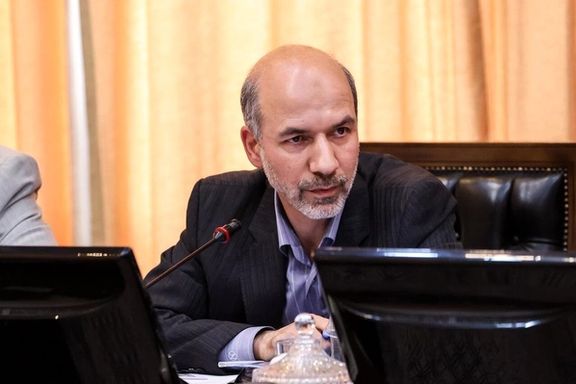
Iran’s energy minister says Tehran will not compromise the rights of the nation regarding its water share from the Hirmand River as it battles with the Taliban.

Iran’s energy minister says Tehran will not compromise the rights of the nation regarding its water share from the Hirmand River as it battles with the Taliban.
As the Taliban continues to ignore the threats by the regime and its military authorities regarding Iran's water share, Energy Minister Ali Akbar Mehrabian once more upped the ante against the militant group on Saturday.
"Despite the fact that our water share has not been given, we are taking necessary measures to supply water to the people," he threatened.
Flowing 700 miles, the river - which is called Helmand on the Afghan side - enters Iran's Hamoun wetlands in the Sistan-Baluchestan province after originating in the Hindu Kush Mountains near Kabul. Lake Hamoun used to be one of the world's largest wetlands, straddling 4,000 square kilometres between Iran and Afghanistan.
The river, which both Afghanistan and Iran depend on for agriculture and drinking water, has been the biggest source of tension for years.
Over the years, Iran has accused Afghanistan of restricting the flow of water from the river by building dams over it, a charge that Afghan authorities deny.
This comes as in the past few days, numerous reports have been published about water shortages in different regions of Iran, especially the Sistan and Baluchestan province.
Alireza Ghasemi, the CEO of Sistan and Baluchestan Province Water and Sewerage Company, told IRNA state news agency that the province is facing a water shortage of about 65 million cubic meters per year and all the cities of the province are suffering from water scarcity.
Iran's share from Helmand is 12 times the figure, which the Taliban refuses to give despite threats by Iran.
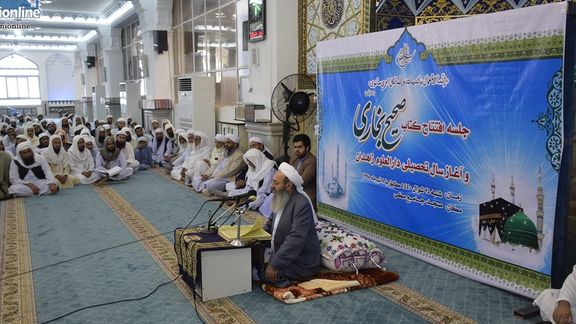
The office of top Sunni cleric Mowlavi Abdolhamid has refuted government allegations that many of the students and teachers of his seminary are in Iran illegally.
“The state media claims that some of the teachers and students of Zahedan Dar ol-Olum [also known as Maki Seminary] have forged their identity documents is absolutely false,” Abdolhamid’s office said in a statement published on his official website Thursday, following a recent mass expulsion.
The state-run television (IRIB) reported Wednesday that authorities arrested 132 preachers who were “foreign nationals” and aired brief interviews with three Afghan men, presumably from among the preachers sent back home, who said they had forged identity documents and entered Iran illegally.
The statement from the Sunni cleric came a day after the Revolutionary Guards (IRGC) linked Tasnim news agency claimed that fifty percent of the students and some of the teachers of Maki Seminary are “foreign nationals” who are illegally residing in the southeastern Sistan and Baluchestan Province.

The expulsion of seminary students was part of government pressure tactics against Abdolhamid who has been a consistent critic of the Shiite clerical regime since 90 protesters were gunned down by security forces in Zahedan on September 30, 2022.
Abdolhamid’s office said the Afghans sent back to Afghanistan were forced to make false statements about forging identity documents and illegal residence in Iran, threatening to reveal details of security forces’ intimidation.
In an attempt to conceal the mass expulsion, Tasnim claimed that a considerable number of seminary teachers and directors with illegal identity documents and forged identities were spared harsh prison sentences and instead sent back to their home country, attributing the reprieve to “Islamic compassion”.
The outspoken, moderate cleric who has become the unofficial voice of the country’s Sunni population - which is roughly 10 percent of the 88 million population - has come under constant pressure from the authorities recently to stop his fiery Friday sermons.
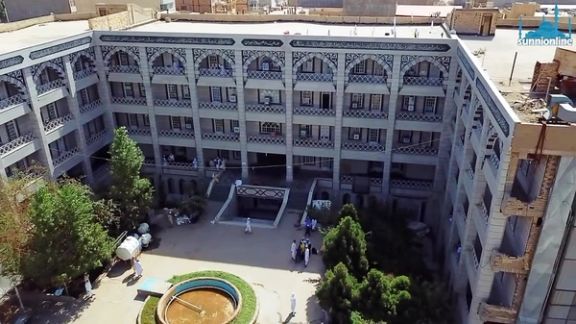
Abdolhamid has criticized the government for funding and controlling religious seminaries and taking away their independence. Iran's government annually allocates hundreds of millions of dollars to Shia religious seminaries and other religious institutions that play the role of its propaganda arm.
Abdolhamid’s call for a referendum with the presence of international observers to decide the future form of government in Iran has massively angered hardliners. He has expressed more liberal views about the role of women in the society after being criticized by some Baluchi activists for not mentioning women and acknowledging equality of men and women in his controversial Friday prayer sermons.
Iranian authorities often refer to citizens of Afghanistan, millions of whom live in Iran as refugees or economic migrants, as “foreign nationals”.
In April 2022, Foreign Minister Hossein Amir-Abdollahian said one million more Afghans had entered Iran since the Taliban took power in August the previous year, bringing the number of refugees and economic migrant to five million.
According to the UN Refugee Agency (UNHCR), only 780,000 of Afghans residing in Iran are recognized as refugees. Most other Afghans are considered economic migrants who have been an important workforce in Iran.
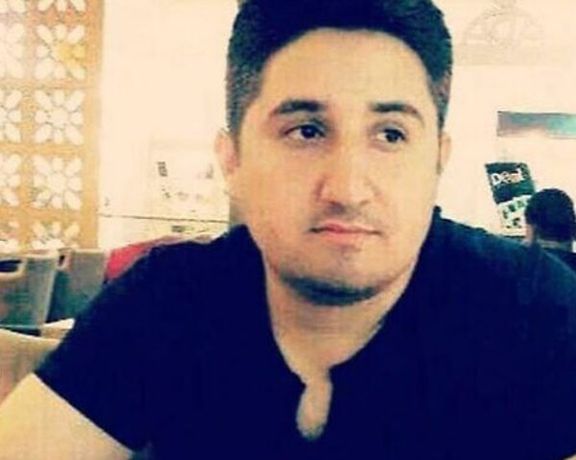
Police in Cyprus confirmed claims by Israel’s Mossad secret service that an Iranian hit squad planned to kill Israelis, the Associated Press reported Saturday.
A security official told the AP that Cypriot police had followed up a tip by “friendly intelligence service” and discovered and Iranian national identified as Yusuf Shahbazi Abbasalilu who was leading the plot.
Mossad released a video in June of the same man being interrogated by its agents and claimed that he was captured in Iran. The video showed him sharing details of his entry into Cyprus through the Turkish occupied north and how he had scoped out the location of the first target for assassination, prepared the weapon and concealed it on word that he must flee just days before the operation.
In the video released by Mossad, he says that the operation was being led by Iran’s Revolutionary Guard, which is listed as a terrorist organization by the United States and faces the risk of also being listed in Europe.
In the past, Israel and Cyprus worked together to foil Iranian attacks on Israelis. Two years ago, an Azerbaijani with a Russian passport, who was acting on behalf of the Iranian Revolutionary Guards, was arrested by Cypriot intelligence services. The hitman was hired to kill an Israeli businessman.
The Associated Press said that Abbasalilu set up base in the Turkish occupied northern part of Cyprus but was sent back to Iran after being identified as a security risk.

Iran's exiled prince Reza Pahlavi, a top opposition figure, has slammed the weakness of the Islamic regime in defending the country's territorial integrity.
In an interview with Kayhan London on Friday, Pahlavi condemned the reaction to Russia's recent claim regarding three Persian Gulf Iranian islands contested by the United Arab Emirates.
Last week, Russia supported UAE sovereignty over three Persian Gulf islands - Abu Musa, the Greater and the Lesser Tunb - causing diplomatic friction with Iran.
“Russia's siding with the illusory claims of the member states of the Persian Gulf Cooperation Council about the three Iranian islands ... shows how the Islamic Republic has auctioned the wealth, soil and territorial integrity of Iran with its unwise and traitorous policies,” Pahlavi said.
Elsewhere in his remarks, the Iranian prince condemned the use of violence against veterans of the Iran-Iraq war, who had gathered in front of the Foundation of Martyrs and Veterans Affairs in Tehran, to protest hardship amid a 100-percent food price inflation and their inadequate pensions.
“Like other foundations and headquarters under the control of the Supreme Leader of the Islamic Republic, Martyrs and Veterans Affairs Foundation is an extremely corrupt and non-transparent institution that the regime uses to loot the Iranian nation and suppress them,” Pahlavi added.
He also censured the approval by the regime to let the members of Iraq's Shiite Hashd al-Shaabi militias and other proxies of the Islamic Republic to study at Iranian universities.
“Iraqi militia forces are allowed to enter Tehran University so that, when necessary, these non-Iranian mercenaries suppress Iranians’ protests,” the exiled prince claimed.
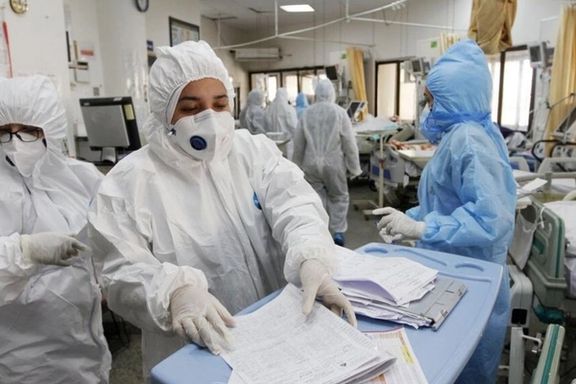
Iran's health ministry says the country's health care network is facing a shortage of 60,000 personnel as tens of thousands have emigrated under financial pressure.
During a televised program on Thursday, Deputy Minister Hossein Farshidi talked about the ‘Family Physician’ plan saying that if the implementation of this plan was a simple task, it would have been implemented in previous administrations.
Iran's healthcare system has faced a workforce crisis in recent years, especially after the COVID-19 pandemic.
Driven by economic and professional problems, as well as a lack of social and political freedoms, an increasing number of Iran's healthcare professionals emigrate.
Salaries for professionals, such as nurses in Iran is less than $200 a month.
Thousands of physicians, dentists, midwives, and nurses have either emigrated in the past few years or are planning to leave for other countries.
There is no transparent data on the emigration of healthcare and other professionals, but medical officials and lawmakers often offer fragmentary information on the scope of the problem.
In 2022, 4,000 doctors applied for good standing certificates to be able to emigrate and find employment in other countries. A large number find jobs in the Persian Gulf Arab states, such as Oman.
In February, Mohammad Sharifi-Moghadam, a member of the central council of Iran's Nurses’ Organization, said between 2,500 to 3,000 nurses were emigrating from Iran each year, based on the number of requests for good standing certificates, confirming that the applicant is entitled to practice medicine in the country.

Revolutionary Guard commander Hossein Salami, visiting Iran's oil-rich Khuzestan, threatened "full war" against any opposition as the province struggled without water.
“We will fight robustly against those who take up arms against us. We will quash those who make the country unsafe, but we must rescue those who need help and are walking into fire,” he said on the sidelines of a meeting with local military and civil officials on Thursday.
The IRGC commander's warning served as a reminder that trouble can break out, as the people in the extremely hot region could engage in protests as they did in July 2021.
He also referred to the oil-rich Khuzestan Province as a place "where all the plans of the enemies come together." Salami enumerated these as "separatism, division among people, transformation of people into what the enemy seeks, and sanctions," adding that the enemy should not be allowed to make any moves in the province.
“We must assist the youth and save our children from the fire of the enemy,” he said, adding that the IRGC must "protect" everyone, whether they are revolutionary and religious or not, "against the massive plots of the enemy" and "save the youth from the claws and cultural war of the enemy."
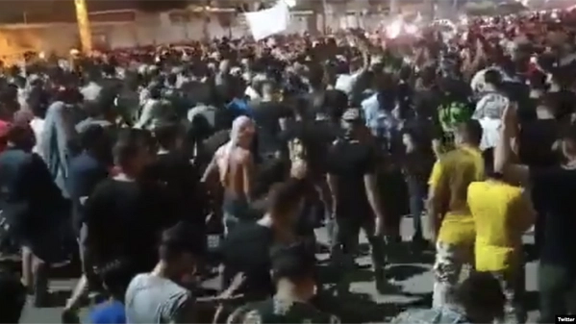
“Salami has basically repeated his usual threats, with promises of saving those who he says have been unwillingly corrupted by the enemy. But making these statements in Khuzestan now and emphasizing that 'war has not finished in Khuzestan,' although it refers to the Iran-Iraq War three decades ago, is noteworthy,” said an Iranian political analyst who requested anonymity, speaking to Iran International.
“Nothing has been done about the water shortage, just the same as in other parts of the country. Moreover, in the past two years, people have become even poorer because of the policies of President Ebrahim Raisi, who had promised to improve their lives in a short time. So fresh protests could happen anytime again,” he added.
In the past few days, there has been a drinking water outage in some neighborhoods of Ahvaz, the capital of the province, and some other areas in the province.
Thousands protested over water shortages in Khuzestan two years ago in July. Thousands of others joined the protests in other provinces, including neighboring Chahar Mahal va Bakhtiari, Esfahan, Lorestan, and Bushehr. Even as far as the city of Tabriz, the capital of East Azarbaijan Province, people took to the streets in support of Khuzestani protesters.
Regime security forces cracked down heavily on the protests, which soon turned into anti-government unrest and lasted for nearly two weeks. Hundreds were arrested, and at least ten protesters were killed by security forces in various cities in Khuzestan and neighboring provinces.
Numerous dams built on the major rivers of the fertile plains of Khuzestan, and the transfer of water to other areas, including Esfahan Province, to support water-intensive industries such as steel, have been blamed for the water shortage in the province.
At the time, officials admitted that at least 700 villages in the province were affected by water shortage, and water had to be supplied regularly by tanker trucks.
Water issues have been at the center of President Ebrahim Raisi's visits in recent months to Sistan-Baluchestan, Kerman, and Khuzestan provinces, where water shortages have impacted many towns and villages. In these areas, summer temperatures sometimes exceed 50°C, and both drinking water and water for agriculture are very scarce in many areas.
Khuzestan has a population of around 5 million and is the second richest province in terms of GDP after Tehran province. Some of the most important battles in the Iran-Iraq War (1980-88) were fought in Khuzestan, particularly in the marshes around the port city of Khorramshahr, as Iraqi leader Saddam Hussein claimed the province as Arab. Northern Khuzestan is mainly populated by Bakhtiari tribes, while the southern regions are home to Arabs, Lurs, and Persians.